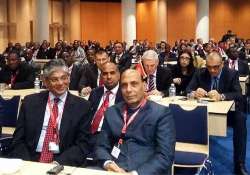Social media being used to instigate communal riots: Rajnath Singh
Monaco: Seeking global cooperation in combating cyber-crime, India has said social media is increasingly being used to instigate communal riots and women and children are equally vulnerable in cyberspace as in the real world.Addressing the

Monaco: Seeking global cooperation in combating cyber-crime, India has said social media is increasingly being used to instigate communal riots and women and children are equally vulnerable in cyberspace as in the real world.
Addressing the 83rd General Assembly of Interpol here yesterday, Home Minister Rajnath Singh said rise of social networks has increased the diffusion of private data users that can be potentially stolen and misused.
“Women and children are equally vulnerable in cyberspace as in the real world, if not more. In recent years, the Internet and social media are being increasingly used to instigate communal riots to destabilise the state,” he said.
During the riots in Muzaffarnagar in 2013, government had said that social media was used extensively by anti-social elements to spread hatred and misinformation among communities.
Similarly in 2012, the mass exodus of people of northeast from south India had taken place allegedly due to the misinformation campaign carried out through Internet and social media.
The Minister asked each member of the Interpol to take a pledge to strengthen the strategy relating to cyber-crime. Singh said that advancements in information and communication technologies have transformed the world into a global village and these changes have accelerated the pace, volume and scope of international trade and commerce.
He said the dynamics of globalisation, the free movements of people, goods and financial transactions across borders have enabled international organised crime groups to expand both their global reach and criminal business interests.
“Anonymity offered by the Internet technology has facilitated communication between the members of terror groups without much fear of being intercepted by law enforcement agencies.
“Information Technology has radically changed the way people work, communicate and interact; it has also altered the work culture of criminals,” Singh said.